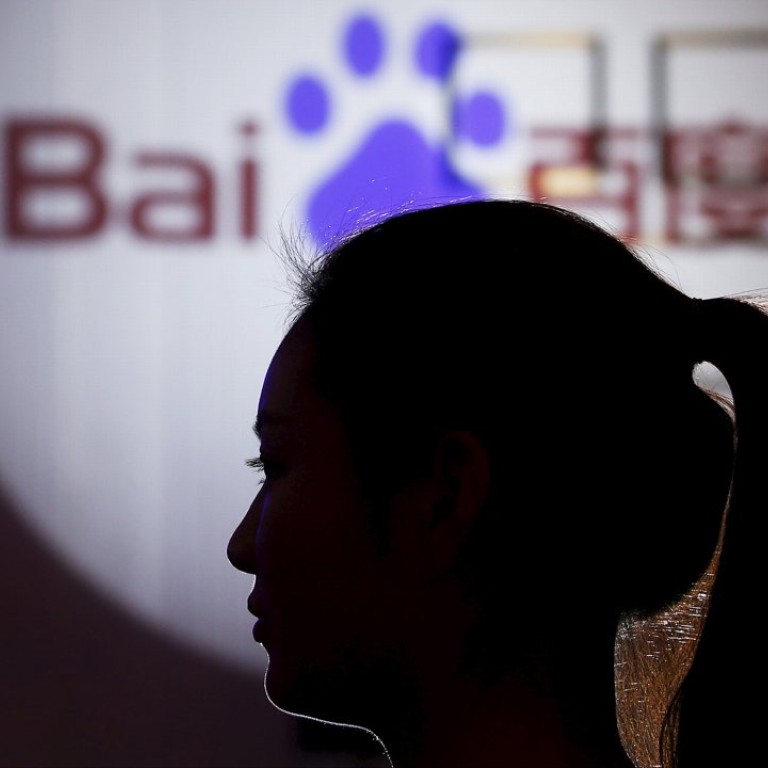
Baidu’s net profit soars 155 per cent to 33.66 billion yuan
China’s online search giant had 1.05 million active online marketing customers last year
Spending by Chinese online search giant Baidu on its online-to-offline (O2O) and streaming video services is expected to continue unabated this year even as efforts are made to streamline the company’s businesses.
Analysts said Baidu could well afford that strategy because of the earning power of its core search business, which enabled the company to post strong earnings last year.
The Nasdaq-listed company on Friday reported a 155 per cent increase in net profit last year to 33.66 billion yuan (HK$40 billion), up from 13.19 billion yuan in 2014, on the back of solid online marketing revenue and subscriber growth.
Services and domestic consumption-related vertical [industries] are supported by the government’s Internet Plus initiative, and hold tremendous potential
Total revenue rose 35 per cent to 66.38 billion yuan from 49.05 billion yuan in 2014.
In a conference call with analysts, Baidu chairman and chief executive Robin Li Yanhong said 2015 was “a touchstone year for Baidu: we made significant progress in broadening our online marketing platform and further extending our reach into transactions services”.
The company said it recorded 1.05 million active online marketing customers last year, up 29 per cent from 2014.
Revenue per online marketing customer last year reached 60,500 yuan, a nearly 2 per cent year-on-year increase.

Baidu said medical, education, travel, financial services and business services made up the top five categories of its search business.
It reduced a hefty cash burden in the fourth quarter after swapping its stake in online travel agency Qunar for a 25 per cent stake in bigger travel market rival Ctrip.com International.
Qunar reported a 1.8 billion yuan operating loss in the first nine months of last year, which dragged down Baidu’s operating margin, according to credit-rating agency Fitch.
Li said domestic consumption and services had been growing on the mainland, despite the overall slowdown in the economy.
“Services and domestic consumption-related vertical [industries] are supported by the government’s Internet Plus initiative, and hold tremendous potential,” Li said. “Our top revenue verticals – retail and e-commerce, local services, financial services, health care and education – reflect Baidu’s vital role in connecting users with merchants in these growing sectors.”
Baidu estimated total revenue in the first quarter of this year would range from 15.41 billion yuan to 15.97 billion yuan, representing a 21.1 per cent to 25.5 per cent year-on-year increase.
Management said investments in Baidu’s O2O transaction services, which include Nuomi group-buying and Waimai food-delivery platforms, and online video platform iQiyi would continue aggressively. Analysts have concerns, however, about how long these unprofitable businesses can be sustained.
“We believe O2O is likely to remain the biggest profitability drag for Baidu over 2016 and 2017, despite its large addressable market,” Daiwa Capital Markets analyst John Choi said in a report. “With Alibaba-backed Koubei and Tencent-backed Meituan-Dianping in the O2O space, we have become increasingly concerned about Baidu’s ability to close up the market share gap with leading players.”
Li recently moved to further streamline Baidu’s asset portfolio by teaming up with iQiyi chief executive Gong Yu to buy the search giant’s 80.5 per cent stake in the online video service. The proposed deal valued iQiyi at US$2.8 billion.
“For Baidu shareholders, the sale of the fast-growing but money-losing iQiyi business could increase 2016 earnings per share by 20 per cent,” HSBC analyst Tsang Chi said in a report.

